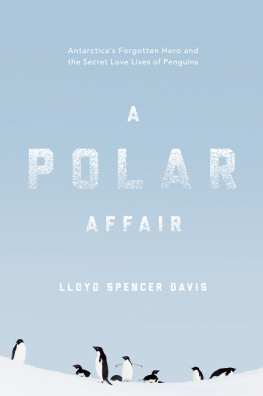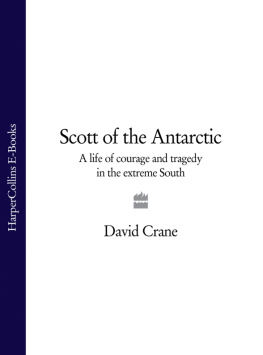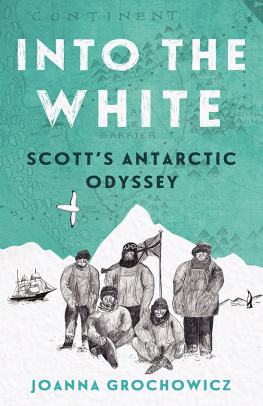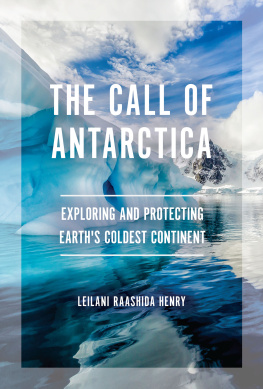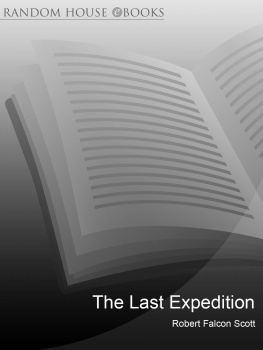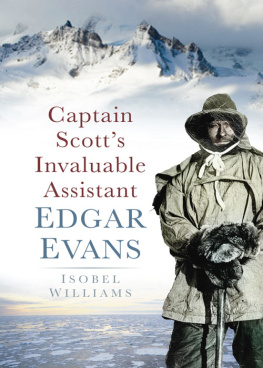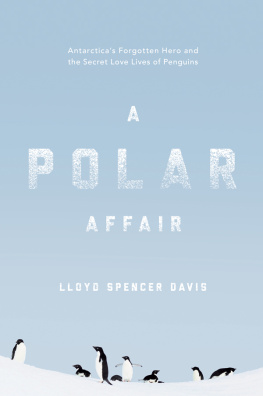Contents
Guide

A
POLAR
AFFAIR
Antarcticas Forgotten Hero and the Secret Love Lives of Penguins

LLOYD SPENCER DAVIS

A POLAR AFFAIR
Pegasus Books Ltd.
148 W 37th Street, 13th Floor
New York, NY 10018
Copyright 2019 by Lloyd Spencer Davis
First Pegasus Books cloth edition September 2019
Interior design by Maria Fernandez
All rights reserved. No part of this book may be reproduced in whole or in part without written permission from the publisher, except by reviewers who may quote brief excerpts in connection with a review in a newspaper, magazine, or electronic publication; nor may any part of this book be reproduced, stored in a retrieval system, or transmitted in any form or by any means electronic, mechanical, photocopying, recording, or other, without written permission from the publisher.
Library of Congress Cataloging-in-Publication Data is available
ISBN: 978-1-64313-125-2
ISBN: 978-1-64313-171-9 (ebook)
Distributed by W. W. Norton & Company, Inc.
www.pegasusbooks.us
To Wiebke
for completing my song
CONTENTS
I t is October 13, 1911. A cold day in Antarctica, even by Antarctic standards. Pack ice extends to the horizon from the tiny spit of land that is Ridley Beach at Cape Adare. A white, windswept tableau, it has been battered into a state of bleakness by the blizzard that masses overhead and pushes hard up against the mountains it hides. It is as uninviting a place as it is possible to find. And yet, as the man squints ahead of him, he can make out a little black-and-white person, a penguin, leaning into the wind, straining, marching toward its destination. This beach. This season. A chance to prove itself.
The man looks at the penguin with some ambivalence. He would rather be pulling sledges than stuck here, marooned on a piece of land not much bigger than a football field, which he will soon have to share with thousands of the little monochromatic blighters that are somewhere out there, in the snow and the ice, moving unerringly toward him. He is dressed against the cold, but his face remains exposed. Still tanned by the sun even after a winters darkness, you could be forgiven for mistaking him as someone other than an Englishman. That night, in the comparative warmth of his hut, with a sigh that is part frustration, part fascination, he takes a fountain pen and in a blue-bound notebook writes, 1st Penguin arrives Oct. 13th, which he underlines with a sweep of the blue-black ink. It is the beginning of the worlds first serious study of penguins.
It is January 14, 1912. A cold day in Antarctica, even by Antarctic standards. A line of men, real men, strain and lean into the wind as they pull a laden sledge across an ice-covered flat and featureless landscape, trudging toward their destination. They are on a mission to prove themselves. The South Pole. Their destiny. Their duty. As Englishmen.
It is March 29, 1912. Nearly eleven weeks have elapsed. Of the five men who marched to the Pole, only three remain, pressed against each other in their caribou sleeping bags. Outside, the wind tears mercilessly at their tent, the spindrift of snow flying inside the tent taunts them as much as the cravings from their empty bellies. To go outside means instant death; to stay inside means a lingering one. The Englishman with the round face picks up his pencil. He glances at the still bodies of his companions. Perhaps they are already dead? And, in a small black-bound notebook, he writes for the last time.
We shall stick it out to the end, but we are getting weaker, of course, and the end cannot be far. It seems a pity, but I do not think I can write more.
Those words would help turn Robert Falcon Scott, failed polar explorer, into a hero: a household name synonymous with courage and perseverance against the odds; a man embraced by a nation. Even his dying postscript For Gods sake look after our people sounds more like a plea to a higher authority to go easy on the whole populace of Great Britain than it does the last wish of a dying man for his beloved wife and son.
Scotts frozen body lies half in, half out of his sleeping bag; an arm over his good friend, the doctor Edward Wilson; his little black notebook and pencil tucked beneath his shoulder. The scrawled signature: R. Scott. Not Robert or Robert Scott, but R. Scott. Stiff and formal, British through and through, even in death.
It is the same day, March 29, 1912, and 220 miles to the north of Scotts tent, the other Englishman, the one who had been studying penguinsalso a doctor, also a member of Scotts last Antarctic expeditioncrawls into a sleeping bag in a hole dug into a bank of snow where he shall spend the entire Antarctic winter with five companions. He picks up his own pencil and writes, Blowing hard all day. It is the beginning of the most amazing story of Antarctic survival and adventure ever told, in a place replete with amazing stories and the frozen last breaths of other adventurers. It is the story of the unsung hero of Scotts Terra Nova Expedition, a man who would become the worlds first penguin biologist but whose achievements will be lost in the public adulation and sympathy for Scott and his thwarted attainments.
It is the story of George Murray Levick.
THE LURE OF
ANTARCTICA

T here is an impression that nature is not just red in tooth and claw, but red-blooded to boot, especially when it comes to sex. Males compete with each other to fornicate with as many females as they can. It is why male elephant seals are so much bigger than their female counterparts; it is why male red deer have antlers; it is, after all, the basis for evolution according to Darwin. Survival of the fittest is really a euphemism for survival of those who fuck the most and thereby sire the most offspring. Survival, in this sense, has got very little to do with longevity: you survive through your children and their children and so on. Heterosexuality, sex between a male and a female, is not a lifestyle choice so much as it is the essence of life itself, the means by which we perpetuate ourselvesat least as far as we vertebrates know it. Consequently, the notion that sex might occur between members of the same sex has long been seen as unnatural and, given the way natural selection works, unlikely: sex without the prospect of producing progeny would seem to be the epitome of an unsuccessful evolutionary strategy. Homosexuality, using this logic, must be an affectation, a foible of human sociology rather than a product of our biology. For a boy brought up in the Victorian era of Great Britain, sodomy was something sordid, an unspoken evil, and certainly the last thing he would expect to see in wild animals. However, life would make a habit of unfolding in unexpected ways for George Murray Levick.
I t is October 28, 1996, a good day in Antarctica by Antarctic standards. Clouds cover half the sky, yet visibility is unimpeded all the way across the sound to massive mountains that sit on the distant horizon like lost children of the Himalayas. It is a balmy 14F and the breeze from the north is not strong enough even to ruffle the patches of dark blue water that lie sandwiched between pieces of pack ice, which extend like a giant jigsaw puzzle all the way to the mountains.

